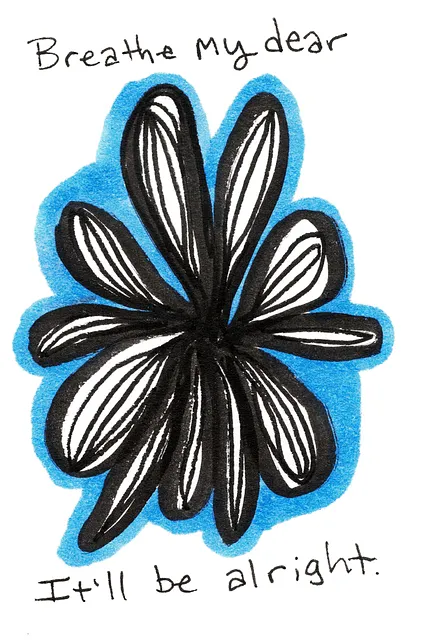When crafting marketing strategies for mental wellness apps inspired by Arvada Kaiser programs, understanding and segmenting specific user demographics (18-35 year olds & working professionals) is key. Tailoring content to concerns like mood regulation and conflict resolution resonates with diverse users seeking stress management, anxiety relief, and personalized well-being solutions. Community engagement through social media, webinars, and local support groups builds a sense of belonging. Leveraging user testimonials and case studies featuring Arvada Kaiser program successes legitimizes the app. By combining evidence-based practices, technology (AI, VR), community focus, and personalized content, these apps meet the growing demand for accessible mental health solutions.
In today’s digital age, mental wellness apps are transforming lives, with programs like those offered by Arvada Kaiser leading the way. To thrive in this competitive market, a robust marketing strategy is paramount. This article guides you through crafting an effective plan for promoting mental wellness apps, focusing on understanding your audience, creating compelling content, leveraging digital channels, and measuring success. By tailoring your approach to specific user needs and utilizing SEO-driven tactics, you can increase app discoverability and engagement, ultimately improving the reach of vital mental health programs like Arvada Kaiser’s.
- Understanding the Target Audience for Mental Wellness Apps
- – Identifying user demographics and psychographics
- – Exploring current trends in mental health app usage
- – Tailoring content to specific user needs and challenges
Understanding the Target Audience for Mental Wellness Apps

Understanding your target audience is a crucial step in developing an effective marketing strategy for mental wellness apps. The market for Arvada Kaiser mental health programs has evolved, attracting users seeking personalized solutions for managing stress, anxiety, and depression. These individuals often range from young adults navigating college pressures to working professionals struggling with work-life balance. Tailoring content and messaging to address specific concerns like mood management and conflict resolution techniques can significantly resonate with this demographic.
Community outreach program implementation plays a pivotal role in engaging this audience. By leveraging social media platforms, hosting webinars, and collaborating with local support groups, mental wellness app developers can foster a sense of belonging and accessibility. Incorporating user testimonials and case studies featuring individuals who have benefited from the apps, such as those participating in Arvada Kaiser programs, can further legitimize the products and attract potential users who identify with these success stories.
– Identifying user demographics and psychographics

In developing a marketing strategy for mental wellness apps, understanding your target audience is paramount. Identifying user demographics and psychographics allows for tailored approaches to reach those in need. For instance, focusing on young adults aged 18-35 who might be struggling with the pressures of modern life, or catering to working professionals seeking self-care practices to manage stress and anxiety. Additionally, targeting individuals interested in emotional well-being promotion techniques and inner strength development can effectively showcase how your app supports these specific aspirations.
When marketing apps like Arvada Kaiser mental health programs, consider the diverse needs and preferences within these demographics. Some users might be open to mindfulness practices, while others seek more structured therapy options. By segmenting your audience, you can create compelling messaging that resonates with each group, ensuring your app’s value proposition is clear and attractive to potential users seeking mental health solutions.
– Exploring current trends in mental health app usage

In today’s digital age, mental wellness apps have become increasingly popular, reflecting a growing demand for accessible and personalized mental health support. Trends indicate that users are seeking convenient, on-demand solutions for stress management, anxiety relief, and overall mental well-being. Apps offering evidence-based practices such as cognitive behavioral therapy (CBT), mindfulness exercises, and mood tracking are gaining traction, especially among younger demographics. The integration of advanced technologies like artificial intelligence and virtual reality further enhances the user experience, making mental health interventions more engaging and effective.
Moreover, there’s a noticeable shift towards apps that foster community engagement, promoting social connection as a vital aspect of mental wellness. Features like peer support forums, group chats, and collaborative goal-setting are being embraced by users seeking both personal growth and collective encouragement. This trend aligns with the success of Arvada Kaiser’s mental health programs, which often emphasize community outreach and support networks. Similarly, initiatives like Stress Management Workshops Organization and Risk Assessment for Mental Health Professionals benefit from digital platforms to reach a broader audience, underscoring the app market’s potential to revolutionize mental health care delivery.
– Tailoring content to specific user needs and challenges

Creating a marketing strategy for mental wellness apps requires understanding and addressing the unique needs and challenges faced by users seeking Arvada Kaiser mental health programs. By tailoring content, such apps can effectively attract and retain users. For instance, incorporating Self-Awareness Exercises tailored to specific demographics or life situations can significantly enhance user engagement. Highlighting how these exercises alleviate stress, anxiety, or other common issues resonates with individuals looking for solutions through digital means.
Additionally, showcasing the benefits of integrated features like Risk Assessment for Mental Health Professionals demonstrates the app’s value in early intervention and prevention. Offering Stress Management Workshops Organization within the app not only caters to users’ practical needs but also positions the application as a comprehensive mental wellness hub. This multi-faceted approach ensures that the marketing strategy aligns with users’ expectations, making the app a go-to resource for those seeking mental health support.
In developing a marketing strategy for mental wellness apps, understanding your target audience is paramount. By delving into demographics, psychographics, and current trends in mental health app usage, particularly within the context of Arvada Kaiser’s mental health programs, you can tailor content to address specific user needs and challenges. This targeted approach ensures that marketing efforts resonate deeply with users, fostering a sense of community and effective support for their mental wellness journeys.






